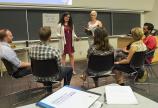Prevention by intervention

Bystander intervention training added to roster of initiatives aimed at preventing sexualized violence.
Bystander intervention—these are the bywords of a new campaign at UVic to raise awareness and educate the campus community about preventing sexualized violence.
Offered through Student Affairs’ new Office of Student Life, new Bringing in the Bystander workshops help students learn practical skills to defuse potentially unsafe situations from spiraling into sexualized violence or sexual harassment. The program’s goal is to train 1,000 students this academic year.
Using a program pioneered by the University of New Hampshire, UVic is teaching students how to overcome resistance to checking in on questionable situations and to intervene when they observe the potential for sexualized violence in social situations and in the community.
“Students really want to intervene. They just need to know how,” says trainer and recent UVic grad Emerald Pringle. “We want to provide a foundation for action. It’s creating a culture.”
The free peer-to-peer training, open to all undergraduate and graduate students, is a three-hour workshop where participants learn a range of scenarios and possible responses. They discuss how to identify situations where bystander intervention is appropriate; identify the continuum of inappropriate sexual behaviours that students commonly witness; gain a deeper understanding of the consequences of sexualized violence; and focus on the supports and needs for survivors of sexualized violence.
Intervention can be as simple as calling out somebody who makes sexist remarks, to recognizing and acting when somebody is vulnerable in a social situation, or helping someone get out of a dangerous situation where they are at risk of being harmed.
Pringle, who graduated with a psychology degree in June, and Kate Lord, a second-year sociology and gender studies student, are among trainers conducting the workshops.
“It’s not sensitivity training, but a leadership program and everyone has the capacity to be a leader—it doesn’t matter your age or gender,” says Lord. “It’s very simple, there are so many opportunities to do this. You have a muscle you can flex to make a difference in the lives of people around you.”
Both Pringle and Lord conducted pilot workshops over the summer and found an enthusiastic response from students.
Joel Lynn, executive director of student services, says bystander intervention training is among many strategies UVic aims at preventing sexual misconduct.
“Sexualized violence is an issue throughout society. Our goal is to empower students to create a compassionate community and become active participants in fostering a safer environment on campus,” says Lynn. “Everyone has a role to play. Bystander intervention training is a pro-active initiative by the university to build awareness and positively influence attitudes and behaviour.”
University of Windsor Prof. Dusty Johnstone brought the bystander invention program to Canada five years ago and has delivered it to thousands of students over the course of 90 U-Windsor workshops. Institutionalizing prevention education is key to an effective program and reaching a wide number of people helps shift the cultural norm, says Johnstone, who consulted with UVic about implementing the program here.
The peer-to-peer model of training is an effective way to deliver the message, she says. “In social psychology, the most effective persuasive people tend to be those we consider to be peer experts. They’re relatable, we connect with them, we feel we have shared experiences but we also recognize that they have expertise in this area.”
Johnstone credits UVic for its approach and goal of training 1,000 students this year. “I do think UVic has really thought through the model of how to do it and reach a wide number of people. That’s really important.”
Students who complete the Bringing in the Bystander workshop receive a certificate of participation, co-curricular credit on their academic transcripts, and a chance to win a $250 tuition credit. To book training for a class or student group, contact: studentlife@uvic.ca.
Bystander intervention training is also part of student orientation during Sexualized Violence Awareness Week and builds on the success of the the student-led Let’s Get Consensual student campaign.
UVic is currently developing a separate policy on sexualized violence. While the university has policies, programs and resources related to prevention, support for those who have experienced sexualized violence, and investigation of sexualized violence, it does not have a single encompassing policy.
Consultations have been ongoing since June with people on and off campus, and a working group with diverse membership will deliver an interim progress report later this month. The aim is to have a draft policy early in the new year and recommendations for the Board of Governors’ approval in the spring of 2017.
“We are trying to consult as widely and deeply as possible,” says working group chair Annalee Lepp, who is also chair of UVic’s Gender Studies Department.
“The university is a large and diverse institution and it’s important for us to speak to as many people as possible to get a comprehensive understanding of the gaps and challenges as well as what support, education and programming is needed.”
Information on the policy review including how take part in the consultations and summaries of the working group’s meetings is available at uvic.ca/sexualizedviolencepolicy.

